- Home
- Mark Zubro
Dying to Play
Dying to Play Read online
Table of Contents
DYING TO PLAY
Blurb
Copyright Acknowledgement
Dedication
Monday 9:01 A.M.
Monday 10:17 A.M.
Monday 4:45 P.M.
Monday 5:05 P.M.
Monday 7:00 P.M.
Monday 10:55 P.M.
Tuesday 12:30 A.M.
Tuesday 2:30 A.M.
Tuesday 7:30 A.M.
Tuesday 8:30 A.M.
Tuesday 11:07 A.M.
Tuesday 12:30 P.M.
Tuesday 1:45 P.M.
Tuesday 3:11 P.M
Tuesday 9:30 P.M.
Tuesday 10:30 P.M.
Tuesday 11:45 P.M.
Wednesday 12:24 A.M.
Wednesday 12:39 A.M.
Wednesday 1:05 A.M.
Wednesday 1:26 A.M.
Wednesday 2:17 A.M.
Wednesday 3:58 A.M.
Wednesday 8:00 A.M.
Wednesday 8:55 A.M.
Wednesday 12:15 P.M.
Wednesday 12:56 P.M.
Wednesday 1:48 P.M.
Wednesday 2:30 P.M.
Wednesday 3:15 P.M.
Wednesday 4:07 P.M.
Wednesday 4:58 P.M.
Wednesday 5:46 P.M.
Wednesday 10:17 P.M.
Thursday 6:23 A.M.
Thursday 8:49 A.M.
Thursday 9:17 A.M.
Thursday 10:42 A.M.
Thursday 11:03 A.M.
Thursday 12:16 P.M.
Thursday 1:37 P.M.
Thursday 4:49 P.M.
Thursday 10:00 P.M.
Thursday 11:02 P.M.
Friday 2:27 A.M.
Friday 2:49 A.M.
Friday 10:10 A.M.
Friday 4:00 P.M.
Friday 7:30 P.M.
Friday 8:06 P.M.
Friday 10:30 P.M.
Saturday 1:32 A.M.
Saturday 2:18 A.M.
Saturday 10:23 A.M.
Saturday 12:15 P.M.
Saturday 4:00 P.M.
Saturday 8:00 P.M.
Saturday 9:30 P.M.
Saturday 11:57 P.M.
Sunday 12:38 A.M.
Sunday 11:00 A.M.
Sunday 1:17 P.M.
Sunday 2:42 P.M.
Sunday 9:44 P.M.
About the Author
MLR PRESS AUTHORS
GLBT RESOURCES
DYING TO PLAY
A Mike King Mystery
MARK ZUBRO
mlrpress
www.mlrpress.com
Gay PI Mike King is called upon to investigate what is happening to a minor league baseball team. He follows the trail of drugs, death, and destruction through the deadly dangers he finds in the rural community. Through the lives of the hot studs involved in baseball, he has to navigate to find the truth about what is happening to them and their dreams.
Copyright Acknowledgement
This book is a work of fiction. Names, characters, places, and incidents either are products of the author’s imagination or are used fictitiously. Any resemblance to actual events or locales or persons, living or dead, is entirely coincidental.
Copyright 2015 by Mark Zubro
All rights reserved, including the right of reproduction in whole or in part in any form.
Published by
MLR Press, LLC
3052 Gaines Waterport Rd.
Albion, NY 14411
Visit ManLoveRomance Press, LLC on the Internet:
www.mlrpress.com
Cover Art by Deana Jamroz
Editing by Neil Plakcy
Print ISBN 978-1-60820-975-0
ebook format
Issued 2015
This book is licensed to the original purchaser only. Duplication or distribution via any means is illegal and a violation of International Copyright Law, subject to criminal prosecution and upon conviction, fines and/or imprisonment. This eBook cannot be legally loaned or given to others. No part of this eBook can be shared or reproduced without the express permission of the publisher.
For their kind assistance I wish to thank:
Barb D’Amato, Jeanne Dams, Jamie Michel, and Scott Jorgenson
MONDAY 9:01 A.M.
Donny Campbell, the younger man, had broad shoulders, eight-pack abs, and hadn’t shaved yet this hour. Tufts of hair peeked out above his form-fitting T-shirt. Black satin athletic shorts clung to narrow hips but bagged at the knees. Connor Knecht, the older gentleman, was dressed elegant-casual: khakis, dark blue blazer, light blue shirt, red tie. Duncan Morgan, my secretary, ushered them into the office.
Knecht rushed over to me, held out his hand, and said, “You’re Mike King, right?” He didn’t wait for my acknowledgment but bulled ahead. “I’m told you’re the best. We need your help. Someone’s trying to kill us all.”
It was good to know the client had gotten positive reviews on my work, plus he seemed eager. Eager and positive and a little forward weren’t inherently bad.
After we shook hands, they sat in the two overstuffed client chairs. I was in the leather swivel chair behind the old wooden teacher’s desk. Connor Knecht glanced at the Picasso on the wall, a real Picasso. I had solved the case of a missing child for a very grateful client who happened to be very rich.
Knecht leaned forward and placed his hands on his knees. Campbell swung his right ankle on top of his left knee. I got an excellent view up to and including a well-stuffed jockstrap. A sly stud, or totally clueless, or a prick tease, or issuing an invitation? His “pleased to meet you” had been delivered in a rumbling baritone. He didn’t notice my checking him out because I found his eyes lingering on my crotch longer than a straight guy’s normally would. He caught me catching his glance and didn’t look away.
Connor Knecht owned the Butterfield, Wisconsin, Mustangs, a minor league baseball team. Donny Campbell was the team captain and played shortstop.
The town of Butterfield was west of Madison on the Mississippi River. Last year the controversy over the team and its new stadium had reached the front pages of the Chicago Tribune.
I said, “After you made the appointment, I checked the Internet for all the articles about what happened. I think I have a grasp of the details about the problems you had in the community as they appeared in the media. None of them said anything about murder.”
Knecht said, “I offered to rescue that town. I left fifty years ago. I made my fortune, and I chose to retire there. I love the town. I wanted to help it come back.” He got misty eyed.
From what I’d read, I knew Knecht had begun with almost nothing and over many years built a financial colossus impervious to economic vicissitudes. Among other things, he now owned the largest dairy farm in Wisconsin.
Knecht wiped his eyes and continued, “The downtown has been dying. Young people are moving away. I should never have gone back. I should have let them wallow in their misery. For years the local entertainment was to come downtown and watch them put up shutters on stores that had just gone bankrupt. Places I knew as a kid were gone. Environmentalists, rival developers, jealous country club types, and resident loonies—none of them wanted their world interrupted.” He coughed, wiped his eyes some more. “Once the referendum passed, I thought things would calm down, but they didn’t. While the grandstand was being built, someone took a chainsaw to every single piece of wood used in the construction. The police did nothing.”
“Absolutely nothing?” I asked.
“They barely took a report. So we put guards on the materials. After the stadium was built, somebody tried to set fire to the grandstand. Not once, but twice. Some jerks even took an old outhouse and burned it on top of the pitchers’ mound. The police claim they couldn’t figure out how this huge privy got there. Members of the team
have been threatened. The police claim they haven’t been able to track down any of the threats.”
Campbell said, “Some of the guys on the team got notes saying we’d be hurt if we didn’t get out of town.”
Knecht said, “And phone calls to their homes, or to their wives. Sometimes notes are left in the locker room.”
I asked, “Has anyone actually been harmed yet?”
“No,” Campbell said.
Knecht said, “It’s the threats to the players that have me worried. We didn’t get those until just this month. I can’t have people hurt. I want the threats stopped. I want the person making them caught and arrested. If something does go wrong, you’ll be right on the scene to provide protection. I was told you know how to keep your mouth shut. I’ve had enough screaming headlines. I don’t want people to know there have been threats.”
“I don’t see how I could do the job you need without talking to people in the town and the members of the team who’ve been threatened. If I talk to people, someone’s going to notice.”
“Talk to them, but be discreet. Yes, they’ll probably catch on. Maybe it will be good if they do. Maybe that would stop whoever’s doing it. I want to at least try investigating without announcing it with a fanfare. We’ve got a lot of pressure on the guys now that Tyler Skeen is doing rehab with the team until he’s ready to go back with the big club.”
“How does that add pressure to the other guys?”
“The media is everywhere. There’s some big deal guy who was a huge part of Skeen’s trial. Guy named Tim Czobel. He’s been sniffing around. He’s from that website TRUTHINSPORTS.COM.”
Everyone who followed sports knew about the case. Skeen had sued everyone in sight who claimed he’d used any kind of drugs. He won. The government never proved he’d done drugs or lied during an investigation. The jury that cleared Skeen had awarded him only one dollar in damages. The jury didn’t believe him, but they didn’t convict him. They’d been polled later. He won because, in the jurors’ minds, the accusations weren’t backed up by strict facts. He’d gotten a buck because they didn’t like him and thought he was getting away with drug use on technicalities dreamed up by his high-priced lawyers.
I asked, “What’s Czobel done?”
“He’s an asshole. My people get harassed. Tyler is a good guy, but he has no control of any of what’s happening to the team or all this publicity. All the guys like him. I do too. The club has invested millions in him, and they’re relying on me to keep him safe while he’s in town. I want to take precautions. I want to do something proactive. As for the players, I figured you could double as one of them.”
“My name has been in the Chicago papers,” I said. “Mike King might be a common name, and I’m not famous, but I’d hate to rely on my lack of fame to keep your secret. It may not be very likely, but people might see it, recognize it, make a logical deduction. I want to make sure you recognize that there’s a chance, however unlikely.”
“They won’t,” Campbell said. “None of the guys read the paper beyond the sports section. The only magazine they read is Sports Illustrated and that’s mostly to whack off to the swimsuit issue. On the nightly news they only watch the sports. Your picture been on the sports news, ESPN?”
“No.”
“You’ll be safe.”
“A simple search on the Internet would turn me up.”
Campbell said, “The guys just use the Internet for porn to whack off to, not the news.”
“People in the town?” I asked.
“I doubt it,” Knecht said. “You being on the team was all I could think of as a disguise. You’d be a natural. I looked into your credentials, and I talked with a number of people. You were also the only investigator who just missed being drafted by several baseball teams out of college.”
“I wasn’t quite good enough for the majors then. I haven’t gotten better. I’m not in these guys’ league. It would become obvious very quickly that I don’t have a skill set that comes close to theirs. Somebody would have had to have heard about me before I showed up on a team at this level. Prospects just don’t drop in out of the sky.”
I’d played college ball a few years ago. We won a lot of games, but we’d never even gotten to the college world series. I started all of our games for two years. Lots of starters in college never get much beyond that. I still ran several miles every day and worked out three or four times a week. That didn’t make me a professional baseball player.
Knecht said, “I’m the owner of the team. I get what I want. Nobody questions me.”
Perhaps he was the last bastion of absolute monarchy. Some people have that kind of magic even in the new century. He asked how much I charged. I named my fee per week for sticking with the team around the clock. A twenty-four-hour-a-day investigation wouldn’t be cheap. I always tack on a surcharge for absolute monarchs. In his case it was double. He didn’t blink at the price. Being impervious to economic vicissitudes must be a great lifestyle.
Campbell said, “You look like you’re in plenty good enough shape. The guys will buy your presence, at least for a while. We gotta know what’s going on.”
Knecht offered, “You could be like the guy they made the movie about. Out of baseball for a while but working hard at it. Now comes another chance. I realize you’ll have to talk to the players. That’s why I brought Donny along. As captain, he’s respected. He’s a good player and a good guy. He can be your guide to the team. He can get you a lot of introductions, give you a feel for the operation.”
I said, “You mentioned a list of possible suspects. Anybody in particular I should concentrate on?”
Knecht said, “Todd Timmons is the main rival developer, him and his slimy lawyer, L.P. Ornstein. Timmons is a young fella with a lot of ego and ambition. He’s got a lot of confidence and not much sense. He wants big chain stores at every exit of the Interstate. He wants to create something new, not preserve the town I love. And the fool doesn’t have enough money. He’s a pup who doesn’t know what he’s doing, and he’s vicious. I don’t trust him.”
I’d want to talk to the locals early on. Knecht gave me a few other names and details about them.
I said, “How much do you stand to lose if your whole investment goes bust?”
Knecht looked like I’d slapped him. Campbell looked confused.
Knecht replied, “I don’t know.”
“You’ve got to have some idea. Any decent businessman knows what he’s spending for what.”
“I don’t see how knowing that will help your investigation.”
I stood up. I’d miss trying to get another glimpse of Campbell’s jockstrap and the delights it concealed. I held out my hand and said, “I’m sorry we won’t be able to do business.”
Knecht half stood. “What? You’re rejecting a huge fee? You’re turning me down?” He sat back down, looked to Campbell. No help there.
“I’m not starting out with only half the information about what’s going on.”
After a number of hems, haws, and harrumphs, Knecht said, “Okay. I guess.” He hesitated some more, caught my eye, looked away, thought a few more moments, sighed. “Yes, I stand to lose money.” He caught my gaze. “A great deal of money.”
I waited.
He said, “Just under fifty million. I was prepared to invest as much again.”
I sat back down and said, “That kind of sum could cause a lot of people to get angry and desperate.”
“Yes,” Knecht said. “Why turn that kind of money away from a community that needs it?”
Why indeed? Maybe I’d find out. I was willing to give it a try. Plus there was Campbell and his jockstrap and the secrets it concealed. I told them I’d do my best. As they left, I contemplated Campbell’s butt. Very nice.
MONDAY 10:17 A.M.
I pressed the button for my secretary. Duncan wore a gray three-piece suit, a slightly off-white shirt, black shoes and socks. He toted the thinnest of laptop computers with him. He used to play b
asketball for Mokena University. Still played pick-up games at the local gym. He’s now a grad student at the University of Chicago who should be indulging in nuclear physics, not keeping my filing and accounts in order. He says he likes the work. He’s been with me five years.
“Knecht is officially a client?” Morgan asked.
“Yes.”
He handed me a manila file folder. “Those are the initial financials.” I glanced inside at about five sheets of paper filled with columns and rows of single-spaced numbers and names. He said, “Nothing odd so far. There’s lots more to find. I’ll keep looking.” I glanced at the totals. Knecht could afford my fee.
I filled Duncan in on the meeting. He took notes on the laptop as I spoke.
When I finished, he asked, “When do you leave?”
I said, “I’ll drive up to Butterfield early this afternoon. What do I have the rest of the week?”
He tapped a few buttons. “Nothing that can’t be rescheduled.”
“Let’s set up a small command post in the nearest town south or east. See if you can’t find me a cheap motel room in Butterfield itself. One that a minor league baseball player can afford.”
I returned home and worked out for half an hour then ran five miles along the lakefront. Before changing, I took my basset hound, Caesar, for a walk. I fed and watered him when we got back. Caesar’s best qualities are uncritical affection and baying at the moon, with eating and pooping coming in third and fourth. He’s exceptional at the baying stuff. He should set up master classes.
I had lunch at Penny’s, a very quiet, exclusive restaurant featuring the hunkiest waiters in town. The food’s not bad either.
Early in the afternoon, I met Duncan at a coffee shop in Elgin. I had a duffel bag from my time in the Navy SEALs. I thought it would go best with my image as a hard-working, up-and-coming baseball player. Duncan arrived with a friend he introduced as Andy, a willowy blond. Andy was to drive my car back to the office. I figured my red Ferrari would be noticed in Butterfield much less it being an absolutely inappropriate possession for a minor league ball player. Duncan had procured a twenty-year-old Ford Escort for me.
I always left my dog with Duncan when I had out-of-town overnight work. Duncan was one of the few people, besides myself, that Caesar actually liked.

 Ring of Silence
Ring of Silence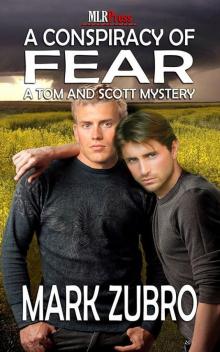 A Conspiracy of Fear
A Conspiracy of Fear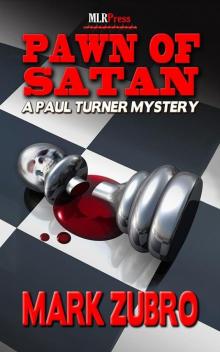 Pawn of Satan
Pawn of Satan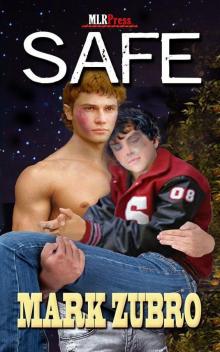 Safe
Safe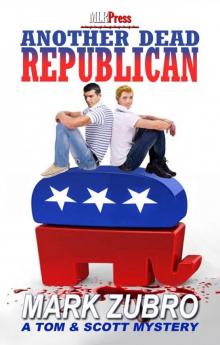 Another Dead Republican
Another Dead Republican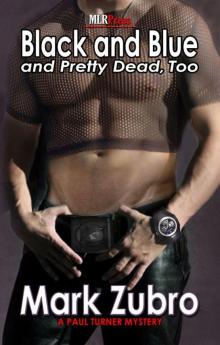 Black and Blue and Pretty Dead, Too
Black and Blue and Pretty Dead, Too Alien Home
Alien Home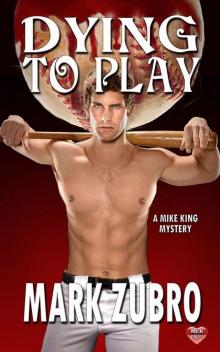 Dying to Play
Dying to Play Alien Victory
Alien Victory